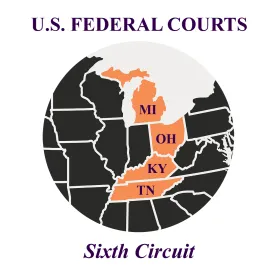Title VII of the 1964 Civil Rights Act prohibits retaliation against employees because they either oppose discriminatory actions (the "Opposition Clause") or because of their participation in an investigation, proceeding, or hearing under Title VII (the "Participation Clause"). A recent decision by the U.S. Court of Appeals for the Sixth Circuit clarifies what qualifies as opposition activity under Title VII. In Jackson v. Genesee Cnty. Road Comm'n, 2021 WL 2155045 (6th Cir. May 27, 2021, Recommended for Publication), the Sixth Circuit reversed a district court's grant of summary judgment in favor of the employer, holding that performance of one's job duties can qualify as protected activity under Title VII.
Background
Defendant Genesee County Road Commission ("GCRC") hired Makini Jackson, an African-American woman, as HR Director in March 2016. In that capacity, she investigated several discrimination complaints from various employees involving the director of equipment and facilities. Jackson investigated each claim, and ultimately recommended to management that the director be terminated. She also negotiated the director's severance package.
In addition to handling employee complaints, Jackson was the Equal Employment Opportunity ("EEO") Officer and approved the Equal Employment Opportunity Plans ("EEOPs") submitted by vendors and contractors who worked with GCRC. Jackson became concerned that the director of engineering and the director of construction were colluding under the table with potential bidders. Jackson edited the EEOP submission instructions to require that all entries and questions regarding the EEO Plan Policy and Process be directed solely to her. Complaints regarding Jackson's communication and domineering style started coming in, from vendors and employees alike.
In October 2016, Jackson was terminated—no reason was provided other than she was an at-will employee. In May 2017, she filed a Charge of Discrimination with the EEOC, claiming she engaged in protected activity. Jackson later brought suit alleging three claims—(1) retaliation under Title VII, (2) retaliation under Michigan's Elliott-Larsen Civil Rights Act, and (3) a claim for wrongful termination in violation of public policy under Michigan law. The district court dismissed all claims, finding neither action qualified as a protected activity because Jackson's conduct did not go beyond her regular job duties as HR Director.
Sixth Circuit Opinion
In reversing the district court, the Sixth Circuit found that Jackson's investigation of employee complaints against the director constituted protected activity. The Sixth Circuit also found that Jackson's conduct within her role as EEO Officer constituted protected activity. The appeals court noted that several of the individuals who complained about Jackson were also the subject of her protected activities. Viewed as a whole, Jackson's actions could be viewed as taking steps to ensure there was no discrimination in hiring both within GCRC and among its vendors, and they constituted protected activity under Title VII. In so finding, the Court rejected the district court's restriction that the opposition clause did not extend to an employee's regular job duties.
Key Takeaways
The key takeaways from the Sixth Circuit ruling:
-
An employee does not have to prove that they engaged in conduct outside their regular job duties to sustain a Title VII opposition clause claim, because the statute's text makes it an "unlawful employment practice for an employer to discriminate against any of [its] employees," suggesting that all employees are subject to one standard, not that employee conduct must fall outside of his or her regular job duties, 42 U.S.C. § 2000e-3(a).
-
The FLSA "manager rule"—under which conduct is not protected activity if it is undertaken while performing assigned human resource duties and undertaken to protect the employer's interests—is not extended to Title VII claims, because the two statutes differ in that the FLSA does not feature an opposition clause. Compare 42 U.S.C. § 2000e-3(a) with 29 U.S.C. § 215(a)(3).
-
To constitute opposition activity, an employee must express opposition in a reasonable manner and must have a reasonable and good faith belief that the opposed practices were unlawful. Examples from precedent for opposition activity protected under Title VII include complaining to anyone (management, unions, other employees, or newspapers) about allegedly unlawful practices and refusing to obey an order because the worker thinks it is unlawful under Title VII.





 />i
/>i

